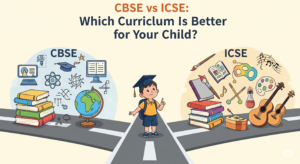CBSE vs ICSE: Which Curriculum Is Better for Your Child
Choosing the right school curriculum for your child is one of the most important decisions you’ll make as a parent—especially in global cities like Dubai and Abu Dhabi, where multiple options are available. When it comes to Indian curriculums, CBSE and ICSE stand out as the top choices for students and parents alike. Both have their strengths, but they differ in teaching style, assessment patterns, subject focus, and long-term benefits.
In this article, we’ll help you understand the key differences between CBSE and ICSE, and guide you in choosing what’s best for your child’s future in the UAE.

Understanding the Curriculum Structure
CBSE is a widely accepted curriculum in India and many countries around the world. It follows guidelines from NCERT and is known for its well-organized syllabus, especially helpful for entrance exams like JEE, NEET, and CUET.
ICSE may suit children with interests in arts, literature, business, or humanities, thanks to its broader subject mix and focus on English.
Language Focus
One key way the two boards differ is in their focus on English.
- ICSE emphasizes strong English skills—both grammar and literature. It uses rich vocabulary and complex texts, which often benefit students planning to study abroad, especially in English-speaking countries.
- CBSE keeps English simpler and more functional, focusing on communication and understanding rather than in-depth language analysis.
Many ICSE students in Dubai and Abu Dhabi perform well in IELTS, SAT, and other English proficiency exams. If your child may study overseas in the future, ICSE could offer a slight edge in English.
Assessments and Exams
- CBSE exams are more straightforward, with direct questions and standard marking schemes. The goal is to test how well students remember and apply what they’ve studied.
- ICSE exams are more detailed and lengthy, testing understanding, expression, and critical thinking.
In the UAE, where school-life balance and extra-curricular activities are also valued, CBSE might feel less stressful for some students. However, ICSE helps develop a deeper understanding of subjects and prepares students for college-style thinking.
Recognition and University Admissions
Universities in the UAE and around the world accept both CBSE and ICSE. Still, there are some key differences between them.
- CBSE students often have an advantage when applying to engineering or medical colleges in India because the entrance exams follow the CBSE syllabus.
- ICSE students often stand out when applying for liberal arts, business, or overseas universities, thanks to their strong academic writing and critical thinking.
Tip: If your child plans to continue studying in the UAE or abroad, check the entry requirements of the preferred universities. Most accept both, but a few may favor one.
Availability in Dubai and Abu Dhabi
CBSE schools are more common in the UAE, especially in Dubai and Sharjah. They are usually more affordable and widely trusted by Indian families.
ICSE schools are fewer, often seen as premium institutions offering smaller class sizes and enhanced learning support.
Examples of well-known CBSE schools in the UAE:
- The Indian High School (Dubai)
- DPS Dubai and DPS Sharjah
- Amity Private School, Abu Dhabi
- Popular ICSE schools:
- Ambassador School (Dubai)
- GEMS Modern Academy (Dubai – offers ICSE and IB)
International Indian School (Abu Dhabi)
Final Thoughts: Which One Should You Choose?
There is no single “best” curriculum—only the best fit for your child.
Choose CBSE if:
- Your child plans to take competitive exams in India.
- You prefer a cost-effective, simpler system with strong focus on Math and Science.
- Your child thrives in a more structured, exam-oriented environment.
Choose ICSE if:
- Your child has strong language skills or interest in arts/humanities.
- You want your child to go abroad for studies and build good communication and thinking skills.
- Your child likes doing projects, learning deeply, and exploring different subjects.
Final Tip for Parents in the UAE:
Talk to your child. Understand their strengths and learning style. Visit the schools if possible, meet the teachers, and review the curriculum they follow. A happy, engaged student always performs better—regardless of the board.
